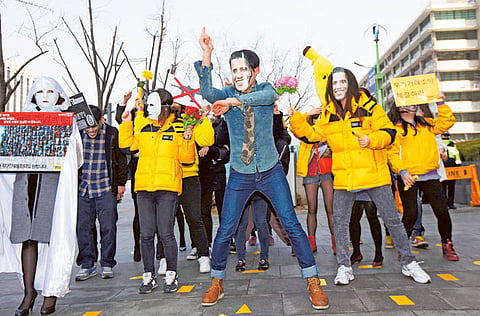US promises military backing for South Korea
Hagel said defence upgrade is designed to “stay ahead” of North Korea threat

Seoul: US Deputy Defence Secretary Ashton Carter on Monday promised to provide South Korea with every military resource under the US nuclear umbrella at a time of heightened tensions with North Korea.
Carter was in Seoul on the second leg of a four-nation tour of US allies and partners in Asia including Japan, the Philippines and Indonesia.
“We remain steadfast to our commitment to extended deterrence offered by the US nuclear umbrella,” Carter said after talks with South Korean Defence Minister Kim Kwan-Jin.
“We’ll ensure all of our resources will be available to our alliance,” he was quoted as saying by Yonhap news agency.
Carter’s visit came just days after the United States announced it would bolster defences against a possible North Korean missile strike in response to Pyongyang’s threat of a “pre-emptive” nuclear attack.
Defence Secretary Chuck Hagel said Friday that 14 more interceptors would be stationed in Alaska, increasing by almost half the 30 already deployed along the California and Alaska coastlines.
Hagel said the defence upgrade was designed to “stay ahead of the threat” from North Korea, which is still believed to be years from having a missile capable of carrying a nuclear warhead to the continental United States.
Military tensions on the Korean peninsula have escalated dramatically since the North conducted its third nuclear test last month.
Pyongyang responded to the subsequent UN sanctions with threats of “all-out war” backed by nuclear weapons.
Some lawmakers in Seoul have suggested it is time for South Korea to develop its own nuclear deterrent, rather than relying on the US umbrella.
China said on Monday US plans to bolster missile defences in response to provocations by North Korea would only intensify antagonism, and urged Washington to act prudently.
“The anti-missile issue has a direct bearing on global and regional balance and stability. It also concerns mutual strategic interests between countries,” Chinese Foreign Ministry spokesman Hong Lei told a daily news briefing.
Hong said China believed efforts to increase security and resolve the problem of nuclear proliferation were best achieved through diplomatic means.
“Actions such as strengthening anti-missile (defences) will intensify antagonism and will not be beneficial to finding a solution for the problem,” Hong said.
“China hopes the relevant country will proceed on the basis of peace and stability, adopt a responsible attitude and act prudently.”
The Pentagon said the United States had informed China, North Korea’s neighbour and closest ally, of its decision to add more interceptors but declined to characterize Beijing’s reaction.
The remarks from China’s Foreign Ministry come days before US Under Secretary for Terrorism and Financial Intelligence David Cohen visits China to discuss implementation of economic sanctions against North Korea.
China has expressed unease at previous US plans for missile defense systems, as well as sales of such systems to Taiwan and Japan, viewing it as part of an attempt to “encircle” and contain China despite US efforts to ease Chinese fears.
China has responded by developing an anti-missile system of its own, announcing the latest successful test in January.
Sign up for the Daily Briefing
Get the latest news and updates straight to your inbox



